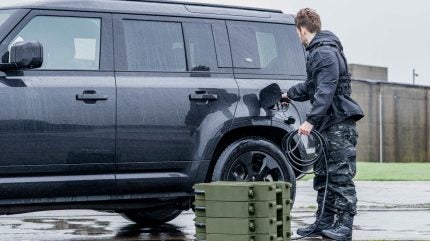
EV charging infrastructure is continuously under fire for its lack of availability, reliability, grid limitations and installation complexities. This in turn leads to charge and range anxiety amongst EV owners.

Discover B2B Marketing That Performs
Combine business intelligence and editorial excellence to reach engaged professionals across 36 leading media platforms.
To help combat this issue, UK based company, Solus Power, has developed a smart, rapid EV charging solution: portable charging devices.
Solutions offered by the company include off-the grid mobile DC-to-DC rapid charging units that can be rolled to vehicles for convenient charging in commercial settings, as well as portable systems that can be stacked or slide underneath vehicles.
These solutions not only allow off-peak energy usage to alleviate grid strain, but also double as energy storage units, contributing to grid stability and energy savings.
The company has recently received financial backing from US investment firm, Marbanc International. The funding will enable Solus Power to expedite the development of its innovative portable charging technology to market and meet demand from defence, fleet, and private EV owners.
We spoke to Stas Leonidou, CEO, Solus Power, to learn more about the technology solutions and to discuss what the financial backing means for the company.

Just Auto (JA): Could you provide some background on the company?
Stas Leonidou (SL): I established Solus Power in 2020 having just bought my pregnant wife an EV and we were living in a mews street in London. There were no charging points on the street to be found. Even the few I could find in the city were either occupied, broken or would only offer a 7kW charge, so it would take all day to charge the car, which is far from ideal when you have a family.
It became clear that charging infrastructure and the very nature of how vehicles are charged was too fixed, static and had huge limitations. Charging needed to be more flexible and mobilised so we’re not tethered to the grid. Electricity is easy to mobilise – we’ve been carrying around power banks to charge our mobile phones for years, it’s the same principle.
I noticed there were some companies that offered a basic battery on van, but that model simply didn’t work. Firstly, if you double park a van in central London while you charge, you’ll understand why. Secondly, paying a technician to wait around for 45 mins while they charge a vehicle is an extremely inefficient use of resource.
Charging needed to be more flexible and mobilised
Our initial concept was a model aimed at the automotive market using a subscription-based service that alerts us when a customer’s EV is running low on range. Our technology is a battery that is deployed underneath the vehicle roadside or stacked; the technician will then go to another customer to deploy another battery then collect the spent batteries after. It offers a seamless service that charges an owner’s car without them having to make any effort or be conscious of it happening.
This is still very much on our roadmap.
However, following a meeting with defence and security company, QinetiQ, they really liked the idea of our portable power technology and saw the potential for its use within a military application. We spent over two years developing the technology and developed ‘Kratos’ a portable, modular, ruggedised power unit.
How do the charging units work in practice?
Our technology is mobile, portable battery technology that can be deployed wherever it is needed, eliminating the reliance on the electrical grid and fixed infrastructure.
Our Kratos power units are described as ‘Jerry Cans of electricity’. They are ruggedised packs the size of an attaché case (55 x 45 x 11cm) and at under 25kg can be carried by individuals to be slid under vehicles or stacked. We use lithium-ion cylindrical cell technology. However, due to the nature of our work their capacity at this moment is classified.
We can reveal they feature modular technology whereby users can connect in-series multiple packs using a flying lead to scale in energy as required.
Each unit can be mated using a flying lead with a high-voltage three-pin cable. A separate control module links all the battery modules together via the battery module connection sockets, and transfers the power to the vehicle through a DC charging cable for an ultrafast charge.
The units have been engineered to withstand the load of a Land Rover thanks to a reinforced structure using steel pillars placed throughout the cell layout and ribs around the perimeter. With use in harsh environments, they are sealed to an IP67 rating.
Overall Ministry of Defence (MoD – the UK military) operational greenhouse gas emissions are currently estimated at 1.8 million tonnes per annum. Although MoD’s fuel demand is heavily dependent on operational activity, battlefield electrification supports MoD targets, which include reducing fuel consumption by a further 10% by 2026.
Hard to access locations, tricky terrains, harsh, dangerous and remote locations cannot be connected without huge cost and difficulty. These are the exact locations militaries operate in and must scale. As such, the technology is also ideally positioned to assist in disaster relief.
What options are offered to the automotive market?
The automotive and CPO (chargepoint operators) industry are faced with the mammoth task of creating an all-reaching network of public charging points but with all the best intentions, there are still going to be black spots. Our strategy is to address the needs of the passenger EV market by providing flexible, on-demand charging solutions to subscribers. This approach enhances the convenience and simplicity of EV ownership while addressing the significant issue of limited and rigid public EV charging infrastructure.
Another market is with the introduction of luxury EV models like Rolls Royce and Bentley. We recognise that some discerning owners might not want to manually handle charging cables. Our technology discreetly charges their vehicles without requiring any action from them. We can even visit their homes to top up their vehicles if they cannot access a charger or prefer not to have one on their property.
Additionally, meet-and-greet parking poses challenges for EV owners, particularly Tesla owners who use sentry mode cameras that slowly drain the battery. Our technology ensures that holidaymakers do not have to arrive with a full charge or worry about their car having no range to get home when they return to an airport.
Another issue our technology aims to resolve is car hire. Typically, customers must return rental vehicles with a required amount of fuel. However, with EVs, recharging is not as simple as refuelling with petrol. Customers would need to plan ahead to charge their cars before arriving at – for example – the airport, which may not be convenient or possible. Car hire companies would then need to take the car off-site to recharge it for several hours, rendering it out of service. Our solution addresses this inefficiency.
How did the investment with Marbanc come about?
Marbanc is globally recognised for funding innovative business ideas and people. They approached us in late 2023 as they were very interested in the potential of our technology. Following the MoU announcement with QinetiQ the funding was secured.
What does this financial backing mean for Solus Power?
This latest funding is not only testament to the belief in the impact of our revolutionary technology, but it will enable us to expedite its commercialisation. Prior to roll out, Kratos units will need to meet specific regulatory standards to comply with legislation.
To enable transport of battery modules, certification should be completed according to testing regulation UN 38.3 (which governs the transport of dangerous goods). Investment will assist in this quite costly process.
What are the next steps and goals for the company?
We are continuing to develop the technology alongside QinetiQ with the aim to bring it to market as soon as possible. Recent investment has meant we are able to expedite our development process. We will look to conduct, evaluate, and conclude testing at QinetiQ’s Vehicle Systems Facility in Farnborough. Following that, a fully functioning demonstrator is planned.
Our aim is to have Kratos on the market by 2024 in the United Kingdom, with further territories following.






